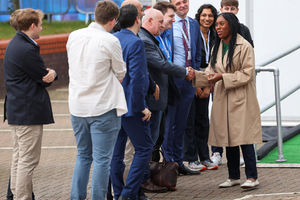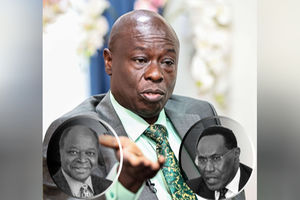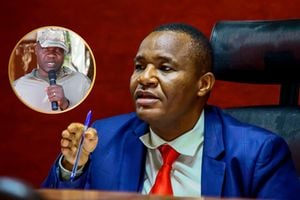
Ethiopian troops ride on a military truck as they patrol the outskirts of Somalia's capital Mogadishu. PHOTO / FILE
A contentious January 2024 deal for a port in the Gulf of Aden between Ethiopia and Somalia’s secessionists in Somaliland is changing the geopolitics of the Horn of Africa in a fast and furious way.
The Ethio-Somaliland deal has turned a sharp spotlight on the role of middle powers in Horn geopolitics. How port deal is shaping the role of Egypt and Turkey in the Horn was the focus of discussions by panelists gathered in Nairobi under the auspices of the Africa Policy Institute (API) and the Council on Kenya-Somalia Relations (CKSR), on September 25, 2024. The new middle power geopolitics is different, more lethal and with far-reaching security impact than the old spill-over effects of the geopolitical wars in the middle-East in the Horn of Africa.
Somalia has rightly accused Ethiopia of undermining its sovereignty, using all diplomatic channels to effectively isolate Ethiopia. Its new détente with Egypt and Turkey is effectively countering Ethiopia’s aggression.
Since August, Somalia has signed a series of new commercial and economic deals with Egypt, now offering military support to its old ally. To be sure, Egyptian military aid to Somalia is not new. During the Ogaden War between Somalia and Ethiopia (1978), Cairo sent arms and logistics to support Somalia. Egyptian rulers see their role in Somalia as that of offering help for Somalia’s unity and counter the security threat posed Ethiopia-Somaliland deal over a port in the Gulf of Eden.
Powerful military
Egypt has the most powerful military in Africa and the Arab world, ranked 15th out of 145 countries worldwide, according to the 2024 Military Strength Ranking of Global Firepower. Cairo is reportedly sending over 10,000 troops to Somalia, signalling its role as a new assertive middle power in the Horn of Africa and the Indian Ocean rim.
As one of the main middle powers in the region, alongside Turkey, Iran, Saudi Arabia, Qatar and the United Arab Emirates, Egypt’s military involvement in Somalia is taking two forms. First, it is now official: Cairo is a leading troop-contributing nation to the new African Union Stabilization Support Mission (AUSSOM) which is set to replace the African Union Transitional Mission in Somalia (ATMIS) by January 2025.
Egypt is sending troops and weaponry to Somalia without the traditional lamentations about who is funding or paying its soldiers. Second, Egypt has signed a military pact with Mogadishu which allows it to deploy troops to any part of Somalia. In the August, Egypt delivered two planeloads of arms. In September, Cairo delivered its first batch of weapons through the Port of Mogadishu.
The Egyptian gesture has received public acclaim. This is a contrast to previous troop contributors like Kenya and Ethiopia which struggled to win hearts and minds of the political leaders and civilians in Somalia.
With the coming of Egypt, the future of Ethiopian troops in Somalia looks bleak. Ethiopia and Somaliland have protested bitterly the coming of Egyptian troops. Since the days of the African Mission in Somalia (AMISOM), Ethiopia has had between 3,000 and 4,500 Ethiopian Defence Forces (EDF) troops in Somalia as well as over 5,000-7,000 troops under a bilateral pact with Mogadishu. Somalia has ruled out the presence of Ethiopia in UASSOM.
The new middle power geopolitics in the Horn is fuelled by the on-going tensions over the Nile, mainly between Egypt and Ethiopia. Addis Ababa has finalised the construction and filling of the Grand Ethiopia Renaissance Dam (GERD), which Cairo considers a threat to its main water source and threatened to go to war. Egypt’s main concern is that Ethiopia will make good its threat to build more and more dams on the Nile. Somalia has previously backed dialogue to resolve Ethio-Egyptian conflict over the Nile waters. Ethiopia’s port deal with Somaliland has pushed Somalia to strengthen ties with Cairo.
Suez Canal
But what has rattled Cairo are the prospects of Ethiopia’s military controlling the gateway to the Suez Canal. Like the Nile, the Suez Canal is Egypt’s second lifeline. The thought of a future Ethiopian navy controlling the entry-point to the strategic Gulf of Eden that links the Indian Ocean and the Red Sea into the Mediterranean Sea via the Suez Canal, is certainly Egypt’s worst nightmare. It will directly challenge Egypt’s trade and maritime economic interests. Cairo’s main interest is to keep ships flowing through the Suez Canal as a important source of revenue charged on vessels sailing through the Canal. Preventing Ethiopia’s expansionism into the Red Sea is Egypt’s main agenda and one of the reasons for its support to Mogadishu.
While Egypt and Turkey have strong historical, religious and cultural ties, their diplomacy has swung like a roller-coaster friendship and tensions, accord and discord. The two have often found themselves allied to different camps in the middle-East geopolitical rivalry. However, Ethiopian expansionism has rekindled old ties between Ankara and Cairo.
On February 14, 2024, a month after Ethiopia and Somaliland signed the port deal, President Erdoğan visited Egypt for the first time in 12 years where he met President Abdel Fattah el-Sisi the duo signed several agreements. On September 4, 2024, el-Sisi paid a return Turkey. The new ties have soft the way for Egypt to deploy troops to Somalia without running into the headwinds of Turkish resistance. This is a pointer to converging interests. Both Turkey and Egypt want to see business flowing through the Suez Canal unhindered. Both Egypt and Turkey are poised to eclipse other middle east powers like the UAE and Qatar, formerly Mogadishu’s closest allies.
In line with President Recep Tayyip Erdoğan’s dream of Turkey’s rise as an Islamic power, Turkey has strengthened economic, military, commercial, ideological ties with Somalia. Turkey has provided humanitarian and medical aid, offered hundreds of Somalis scholarships, trained an elite squad of the Somali National Army, and built an embassy and a military camp in Mogadishu, the largest on the African soil. Turkish firms continue to manage the main port and airport in Mogadishu today. And the Turkish Airline planes are linking Mogadishu to many African and outside airports.
Emerging from decades of civil war, the al-Shabaab menace and an unfinished reform agenda, is vulnerable to the rise of middle power influence. But so far, Somalia has played a superb diplomatic game to defend its sovereignty and territorial integrity.
Professor Peter Kagwanja is former Government Adviser, the Chief Executive at of the Africa Institute (API) and Adjunct Scholar at the University of Nairobi and the National Defence University (NDU), Kenya.








